Blog
Fluoride For a Healthy Smile
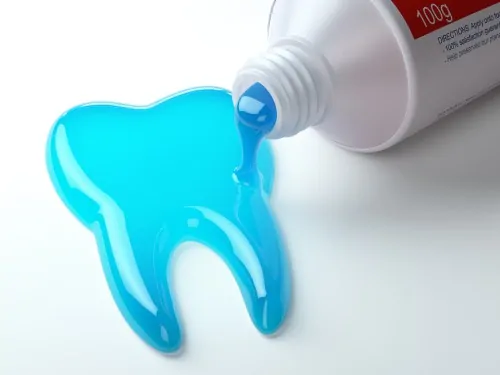
When it comes to the oral health of you and your family, you may have heard about the importance of fluoride. You may have also heard a few arguments against it. At our dental office in Douglasville, we want to take the opportunity to talk a little bit about fluoride, what it is, why it’s crucial for our smiles, and yes, even discuss a few risks.
What Is Fluoride?
Fluoride is a mineral that’s found in nature, specifically in soil, water, plants, and the air we breathe. In the world of dentistry, fluoride is used to help strengthen tooth enamel and protect teeth against decay and cavities. It can also help repair early decay caused by demineralization.
Demineralization occurs when acids from bacteria and foods linger around and begin to eat away at the protective layer of enamel. But enamel isn’t the only thing affected during demineralization. Our teeth can also lose minerals such as calcium, phosphate, and fluoride. These minerals are essential to keeping our teeth tough and strong to fight off decay… so it’s important to replace them either through the foods we eat or from fluoride treatments from your Douglasville dentist.
Who Should Get Fluoride?
When you think of fluoride, you may assume that it’s only important for kids. But nearly everyone’s smile can benefit from fluoride. Your dentist in Douglasville will most likely recommend that both you and your children receive a fluoride treatment at every dental appointment to help build strong teeth and protect against cavities. These treatments are typically either a varnish, foam, or gel that are applied in the dental office.
Where to Get Fluoride?
Besides having your dental team apply a fluoride treatment, there are other ways you can help your teeth get enough fluoride. Most public water supplies have added fluoride, and it can be found in some foods you eat. There’s also fluoride in many kinds of toothpaste and mouthwash. Fluoride supplements are also available and may be recommended if you don’t have fluoridated water or if you need an extra boost of fluoride.
Is Fluoride Safe?
Fluoride is safe for children and adults in recommended amounts, which will vary based on things such as risk, need, and age. However, fluoride can be hazardous if it’s used too much. This risk is extremely low as it’s extremely difficult to expose yourself to dangerous levels of fluoride through fluoridated water, toothpaste, and fluoride treatments from your dentist. A good rule of thumb is to remember to always follow your dentist’s recommendations, don’t swallow toothpaste or mouthwash, and monitor children’s brushing habits at home.
If you’re unsure if fluoride is right for you or your family, or if you have questions about fluoride, we welcome you to call our Douglasville dental office and schedule a visit. We’re here to help!
How to Pick the Best Dental Floss
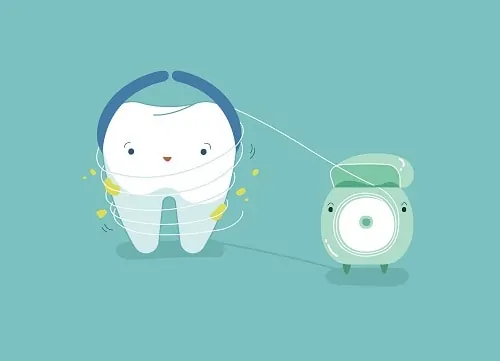
When you walk down the oral health care aisle at your local supermarket, it can quickly become overwhelming. There are just so many different types of toothbrushes, tubes of toothpaste, bottles of mouthwashes, and packets of floss to pick from. How in the world are you supposed to pick the best products for you? Don’t worry, today the team at our Douglasville dental office is here to help narrow your options for one of the most important tools in your oral hygiene toolbox — floss.
Flossing can sometimes be overlooked as a crucial part of your oral health, but the truth is, flossing every day is incredibly effective at lowering your risk for cavities and gum disease. This means that you need to choose a type of floss that you will use regularly and properly. Let’s take a closer look at the three most common types of floss recommended by your dentist in Douglasville.
Traditional Floss
The most common type of floss is the traditional string floss found in those little, compact containers. This time-tested original can work really well for many people as it’s what they first learned to floss with, so it’s comfortable to use. However, those who may have trouble using their hands or fingers may not be able to reach around each tooth or back into the molars. This is when an alternative option should be considered.
Floss Picks
Floss picks are those little plastic tools that have a small piece of floss threaded between two posts. They’re pretty inexpensive and can be just as effective as traditional floss if used properly. However, while some people may find floss picks easier to use, others find just the opposite. So essentially, there’s no real right or wrong answer when it comes to which is better. The best way to decide is to try both options and see which is easier for you to use. Keep in mind, floss picks only use a small section of floss so you may need to use a few flossers each and every time you floss.
Water Flosser
A newer and more high-tech flossing option that’s making its way into bathrooms across the country is electric water flossers. These tools are highly effective at removing plaque and bacteria, and many studies suggest that they may be the most effective of any flossing device. But they don’t come without a few potential cons. Water flossers need to either be plugged in or charged, so they aren’t incredibly convenient. They’re also larger in size so storage and traveling may pose a few complications. Lastly, they can be pricey, although they do last a long time and reduce waste.
What matters most to your dentist in Douglasville isn’t necessarily which type of floss you use, but rather that you floss regularly and properly. If you’re finding that flossing is challenging and you’re looking for a better solution, we welcome you to call our dental office in Douglasville. We’re always happy to help find the best tools for each one of our patients.
The Surprising Summer Activity That Can Harm Your Teeth

Swimming is a popular summertime activity, and it’s good for you too! It’s a great form of cardiovascular exercise, it’s easy on the joints, and it’s a sweet way to cool off on those hot days. But the team at our Douglasville dental office knows that there could be some harm lurking in your pool water that you probably don’t know about.
Swimming Pools & Your Teeth
Many pools use chlorine to keep pool water free of dangerous bacteria that could be harmful to humans. But this chlorine may also put another part of your body at risk for damage — your teeth.
Research dating back to the 1980’s studied the negative effects of chlorine on your oral health, particularly your tooth enamel. Part of what chlorine does is help level out the pH balance of pool water, so it’s safe for families. For most situations, pool water should have a pH between 7.2 and 7.8. But when this drops below this ideal range, the water actually becomes acidic. If this happens and you spend a lot of time in the pool, or a lot of water gets into your mouth, the acid can wear away tooth enamel and even cause tooth discoloration.
Why Is Tooth Enamel Important?
Tooth enamel is the super-strong protective layer of our teeth. It helps keep dangerous plaque and bacteria from eating away at the teeth and causing cavities. If tooth enamel erodes, whether it’s from an improperly chlorinated pool, drinking too many acidic drinks like lemonade, or brushing too hard, teeth are at increased risk for decay, wearing down, and sensitivity.
Who Is At Risk?
While anyone’s teeth can suffer from enamel erosion, the cases in which the erosion is caused by chlorine is often found in competitive swimmers or those who spend a lot of time in pools. The truth is if you only swim occasionally, you’re probably not at risk.
Signs of a Problem
Two of the first signs that a pool’s pH is too low are irritated skin or burning eyes while swimming. Over time, you may start to notice brown spots on your teeth (known as swimmer’s calculus) or experience increased tooth sensitivity. If you notice any of these changes, visit your dentist in Douglasville as soon as you can.
Protecting Your Tooth Enamel
Besides proper brushing and flossing, there are steps you can take to help protect your enamel against erosion — and no, you don’t need to give up swimming. Just make sure you test the water for proper pH levels regularly and try to keep pool water out of your mouth as much as possible. Of course, it’s also important to see your Douglasville dentist at least every six months for regular checkups and professional cleanings.
Do I Really Have to Get My Wisdom Teeth Taken Out?
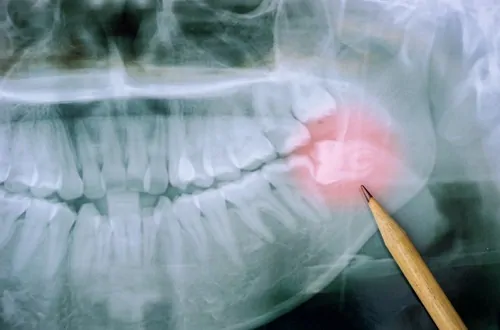
Extracting wisdom teeth is an incredibly common procedure. In fact, over 90% of Americans have their wisdom teeth removed. While there are some occasions when wisdom teeth surgery isn’t necessary, more often than not, it’s recommended to prevent additional problems and pain in the future. Let’s take a look at why so many Americans have their wisdom teeth removed and why our dental office in Douglasville may recommend it for you.
There’s Not Enough Room
Perhaps the most common reason your dentist in Douglasville may recommend having your wisdom teeth taken out is that there simply isn’t enough room for these four teeth to fit. If there’s not enough room in your mouth and the teeth are allowed to erupt anyway, other teeth may shift, and this can cause additional problems. For example, you may need orthodontics to correct any overcrowding or crookedness that may occur. Your bite can also be affected by overcrowding, which can lead to jaw pain, headaches, and neck pain.
Impacted Wisdom Teeth
Another problem with not having enough room for wisdom teeth to erupt properly is that they can get stuck developing in the bone. This is referred to as having impacted wisdom teeth. Once the teeth are impacted, treatment tends to become more complicated, so it’s best to catch any potential problems with wisdom teeth and remove them early. If your wisdom teeth become impacted, your Douglasville dentist will talk to you about the most appropriate treatment to help.
Wisdom Teeth Are Hard to Take Care of
Wisdom teeth, also known as third molars, are situated all the way in the back of the mouth. Because of this positioning, it can be difficult to reach them with a toothbrush and floss. When not cleaned thoroughly, bacteria can linger around and increase the risk of cavities and even gum disease.
Seeing the dentist at least every six months is important for everyone, but especially for those who are in the prime years of wisdom teeth development, usually between the ages of 17 and 25. At your visits, your dental team can keep an eye on your wisdom teeth development through regular x-rays and make the appropriate treatment recommendation for you when it’s the right time.
If your regular checkups at our dental office in Douglasville show that your wisdom teeth are putting you at risk for impaction or greater problems later on, we will probably recommend having them removed to keep your mouth in its best, healthiest shape.
The Importance of Healthy Gums
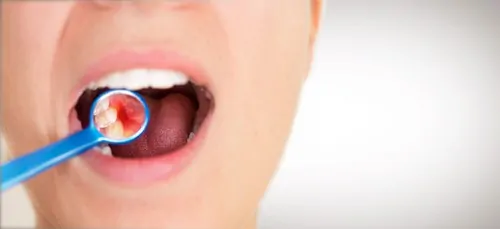
Often we think of a healthy mouth as straight, white teeth. But the truth is, a healthy mouth goes beyond our smiles. Our gums are easily overlooked when it comes to talking about our oral health. However, our gums are crucial to not only our mouths but to our overall health. At our dental office in Douglasville, we strive to educate our patients about the importance of healthy gums, so in this blog, we’re going to talk about just how serious of a role our gums play in our bodies.
Gum Disease
When we don’t take care of our gums, we can develop a serious condition called gum disease. Gum disease is caused by a buildup of plaque. Plaque is loaded with dangerous bacteria that if not removed, can lead to infection of the gums. This infection is gum disease. There are three stages of gum disease — gingivitis, periodontitis, and advanced periodontitis.
Gingivitis – This is the earliest stage of gum disease and can be treated.
Periodontitis – If gingivitis is left untreated, it can progress into periodontitis when the disease starts to affect the bones holding our teeth in place.
Advanced Periodontitis – As periodontitis gets worse, it can turn into advanced periodontitis. If this happens, the bones supporting our teeth are beginning to break down, and we may experience tooth loss.
Gum Disease & Your Body
The bacteria that cause gum disease can also lead to other serious problems in the body. In fact, many research studies have shown a correlation between gum disease and several health conditions, such as:
- Lung Disease
- Cancers
- Heart Attacks
- Strokes
Signs of Gum Disease
- Gums that bleed during and after tooth brushing
- Red, swollen, or tender gums
- Persistent bad breath or a bad taste in the mouth
- Receding gums
- Loose or shifting teeth
In the early stages, gum disease may not necessarily show any signs. This is why appointments with your dentist in Douglasville every six months are so important. Your dental team is trained to look for early warning signs of gum disease so they can recommend treatment quickly. Early diagnosis is key to successful treatment.
If it’s been more than six months since your last visit or you notice any signs of gum disease, call our dental office in Douglasville to schedule a visit.
Pregnancy & Dental Care: Is it Still Safe?

To all of the expectant mothers out there, both current and potential patients, everyone at our Douglasville dental office wants to say, “Congratulations!” Whether you’re a new parent experiencing every special moment for the very first time, or a seasoned parental pro who knows exactly how this all goes, it’s essential not to put off your upcoming cleanings or treatments.
Let’s take a look at some of the reasons you need to proceed with dental care when you’re expecting.
1) Your oral health and overall health are related.
Not one but three of some of the country’s most respected dental/medical organizations (the American Dental Association, the American Congress of Obstetricians and Gynecologists, and the American Academy of Pediatrics) encourage every mother to see the dentist, especially during the earlier phases and stages of your pregnancy. What’s going on in your mouth (i.e., gum disease or infections, cavities, decay, etc.) can have a direct result on the rest of your body. It’s important to address issues early for improved health for you and your baby.
2) Hormonal changes can lead to changes in your gum health.
Some women notice no changes in their teeth or gums throughout their pregnancy, but some mothers develop inflammation in their gums causing tenderness, swelling, and bleeding. This condition is commonly referred to as “pregnancy gingivitis.” Your Douglasville dentist will tell you it’s important to monitor your gum health and make sure your gingivitis symptoms are taken care of with more frequent cleanings.
3) Changes in diet and sickness can lead to increased tooth decay risk.
There’s no secret that when you become pregnant food can either be your best friend or your enemy, depending on much you’re forced to face morning sickness issues. Increasing the amount of carbohydrates or sugar you regularly consume or excess acid in your mouth from morning sickness can both lead to decay and tooth enamel erosion.
4) Dental treatment and cleanings in all three pregnancy trimesters is safe.
Depending on the nature of your procedure, it’s rare that we have to postpone treatment due to pregnancy concerns. The second trimester is usually the safest, most easiest time to get your dental work done. It’s also safe in the last trimester, but some patients find uncomfortable or difficult to sit back during treatment. It’s certainly your choice on how to proceed with treatment during pregnancy. If your procedure is vital to your medical health (and your baby), you should get the work done. If it’s something you’ve elected to do on your own and can wait, you’re encouraged to do so until you’re 100% ready.
Seeing your dentist is crucial during your pregnancy, and so is maintaining your regular brushing and flossing routine at home. We understand that there are so many things you have to do, so many new emotions to handle, and so many days where you’re just too tired to even think. No matter where you’re at in your pregnancy, you can always call our Douglasville dental office. We’re happy to answer your questions, schedule you for a visit, and alleviate your anxiety.
What is a Tooth Abscess?

An abscessed tooth isn’t a very fun topic to talk about, but it is necessary. Many people will experience an abscess in their life as well as the pain that often comes with it. At our dental office in Douglasville, we’re here to share some important information about tooth abscess, so you’re able to recognize the signs and get treatment quickly.
What is an Abscess?
A tooth abscess is a painful collection of pus that’s brought on by a deep tooth infection that has spread into the tooth’s root and even the bone. If treatment is not sought early, the infection can lead to serious problems and perhaps require a tooth extraction.
Signs & Symptoms
Tooth pain is a common sign of an abscess. Other signs and symptoms of an abscess include:
- Face or jaw swelling
- Sensitivity with increased pressure
- A bad taste in your mouth that may taste salty
- Pain in the jaw, neck, or ear
It’s worth noting that, occasionally, an abscess won’t show any symptoms at all. When this happens, your dentist in Douglasville is usually the one to diagnose an abscess at one of your dental checkups through the use of a dental x-ray.
Causes of an Abscessed Tooth
Often untreated decay is the main cause of an abscess. But there are other things can lead to a painful abscess, including an injury to the mouth, certain dental treatments (such as a root canal), crown, or filling, or from clenching or grinding.
Risk Factors
There are several things that can increase your risk of getting an abscess including:
- Poor dental hygiene
- Eating too much sugar
- Dry mouth
- Not seeing your dentist in Douglasville every six months
All of these factors increase your risk of decay, and in turn an abscessed tooth.
Prevention
Since many abscesses are caused by untreated decay, the best thing you can do to prevent an abscess is to follow a good oral hygiene routine of brushing and flossing every day. It’s also recommended that you visit our dental office in Douglasville at least twice a year for preventative care, professional dental cleanings, and x-rays.
If it’s been longer than six months since your last dental appointment or you’re experiencing any pain or discomfort, we welcome you to schedule an appointment with us today.
Oral Cancer Awareness

Every April, the dental community recognizes Oral Cancer Awareness Month to educate our patients and neighbors on this scary, and sometimes deadly, disease. In fact, oral cancer kills one person every hour, every day. More than 50,000 people are diagnosed every year. At our dental office in Douglasville, we want to do our part and help our community recognize the risks and signs of early cancer.
Who is at Risk of Getting Oral Cancer?
Anyone can get oral cancer. But there are several things that can put someone at greater risk. While we can’t change some of these risk factors, there are definitely some we can control. Some factors that increase the risk of oral cancer include:
Tobacco Use: 80% of oral cancer diagnoses are in tobacco users including those who smoke cigarettes, cigars, or use smokeless tobacco.
Drinking Alcohol: Nearly 70% of those diagnosed with oral cancer are heavy drinkers.
Gender: Men are two times more likely to develop oral cancer than women.
Age: Those over the age of 50 are at increased risk of oral cancer.
The Sun: Unprotected sun exposure tends to put people at greater risk of oral cancer.
Oral Cancer Symptoms
Even though oral cancer can be treated successfully, treatment and survival increase greatly when oral cancer is caught early. This is why it’s incredibly important to know the signs of oral cancer. Some common symptoms of oral cancer include:
- A sore that doesn’t go away
- Irregular areas such as lumps, rough spots, or erosion
- Red or white patches
- Pain or numbness
- Difficulty speaking, chewing, or swallowing
If you notice any of these symptoms, call your dentist in Douglasville and schedule a checkup.
Regular dental appointments don’t just help protect your teeth from cavities. They’re also crucial to monitor your overall oral health. During your dental cleanings and exams, your dental team will be on the lookout for any concerning areas or warning signs that there may be a problem so that treatment can begin sooner rather than later. Early diagnosis of oral cancer may save your life.
Don’t put off your dental appointments. Call our Douglasville dental office to schedule an appointment today.
I’m Missing a Tooth. What Should I Do?
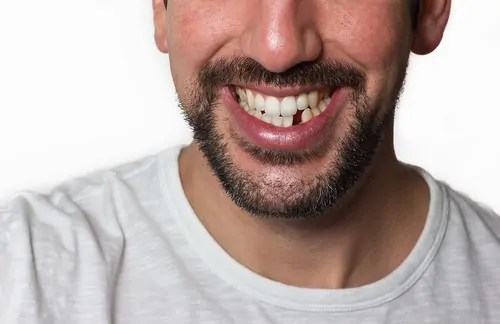
Sometimes no matter how much we take care of our teeth, they get damaged and injured or become susceptible to decay and deterioration. This means a tooth can come loose and eventually fall out… if it didn’t get knocked out due to a trauma like a car or sports accident.
If you’re missing a tooth, then you should call your Douglasville dentist as soon as possible so we can do a comprehensive exam and talk about how we can fix your smile and make it whole again. We understand what it’s like when you’re missing a tooth. Do you hide your smile? Do your teeth make you feel more self-conscious? Do you have to avoid certain foods or chew on one side of your mouth due to the pain or discomfort?
Let’s take a look at some of the dental solutions that are available to you to fix your missing tooth (or teeth) so that we can restore your smile’s function and beautiful look.
Common Tooth Replacement Options
It’s important to call your dentist in Douglasville as soon as you lose a tooth or if you have one that is loose and in danger of falling out. Depending on your individual needs, there are numerous treatment options delivered with some of dentistry’s most state-of-the-art dental technology.
- Single Dental Implant
A dental implant is a life-changing restoration that actually acts like your missing tooth’s natural roots to help keep your jaw bone stimulated and healthy. To top it off, you’ll get a custom, tooth-colored crown that will create a natural look. Dental implants restore your smile to its former function so you can eat foods you may have been avoiding. They can last a long, long time or even for a lifetime.
- Bridge
Just like the name implies, a dental bridge can bridge the gap that’s created when you end up missing a tooth or even multiple teeth. Dental bridges are usually made up of two or more dental crowns. The entire restoration is then anchored to neighboring healthy teeth. The result is a custom solution that can give a full smile again.
- Dentures
When you’re missing multiple teeth, dentures may be the right solution for you. Thanks to advancements in dental technology, dentures of today look and feel natural and can give you back a confident, healthy smile. Dentures can be used to replace both upper and lower missing teeth.
If you’re missing a tooth or teeth, don’t hesitate to call our dental office in Douglasville. There are plenty of options available to help bring life back to you and your smile. Your renewed confidence and a healthy smile starts with a phone call and a visit to our office. We’re ready when you are!
Why It’s Important Not to Ignore Your Snoring

Think back to the last time you woke up feeling refreshed and ready to take on your daily demands. It’s so nice to have the energy and mindful clarity to help you be productive and make the most of your day. Has it been a while since you felt like this? Does your bed partner complain because your snoring keeps them up at night?
Your Douglasville dentist will tell you that if snoring is disrupting your life (and your family’s sleep), it might be time to consider learning more about something called sleep apnea. It could be the annoying (and dangerous) condition that’s keeping you and the ones you love from enjoying a peaceful, rejuvenating night’s sleep. Let’s take learn more about sleep apnea, its symptoms, and side effects.
What is Sleep Apnea?
If you think snoring while sleeping isn’t that common, think again! The American Sleep Apnea Association estimates nearly 90 million Americans are snoring away while trying to achieve a healthy night’s sleep. Sometimes snoring is just that, and people who have this condition are called “simple snorer’s” or primary snorers. This generally true for about half of the 90 million people sawing logs at night.
But for the other half, there’s a good chance they’re struggling with a more serious sleep disorder known as sleep apnea without even knowing it. Sleep apnea is dangerous because you can wake up as many as 100 times during the night, stop breathing, snore loudly, and struggle to regain a normal breathing pattern – and you don’t even know it!
Are There Different Kinds of Sleep Apnea?
Sleep apnea is usually classified in two distinctively different ways:
1) Obstructive Sleep Apnea (OSA) – This is, by far, the most common form of sleep apnea being diagnosed across the country today. If you or someone in your household is diagnosed with sleep apnea, it’s usually caused by a blocked airflow during sleep due to your soft tissue collapsing in the back of your throat. At our dental office in Douglasville, we’ll always tell you to seek help if you or someone in your family continues to have issues with snoring.
2) Central Sleep Apnea – This type of sleep apnea is more difficult to diagnose because it involves a specific problem with how your brain signals your breathing muscles to respond. Unlike OSA, your airway isn’t blocked. In this case your brain fails to signal your muscles to breathe. Brain tumors, brain infections, and strokes are often to blame.
Snoring and Sleep Apnea
Even though snoring can be a big indicator of sleep apnea, it also wreaks havoc on your oral health due to dry mouth because everyone needs saliva in their mouth to help:
- Rinse and cleanse your teeth to help reduce plaque build-up
- Wash away food particles leftover from brushing and flossing
- Remove dead cells that can lead to sore, infections, and bad breath
- Neutralize acids that cause plaque and erode your tooth enamel
Our Douglasville dental office will always go out of our way to keep you and your smile healthy. If you think snoring is affecting your teeth, don’t hesitate to talk to us. We’re always happy to help and answer any questions you may have.
